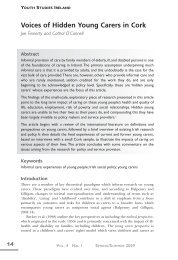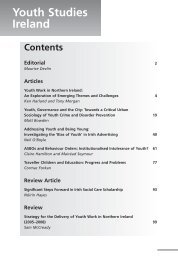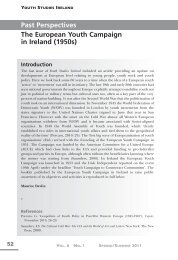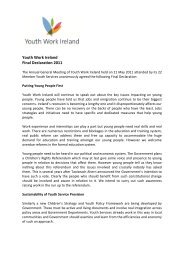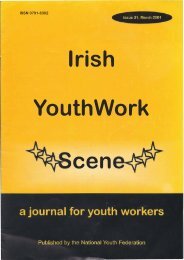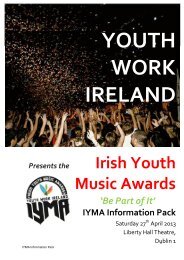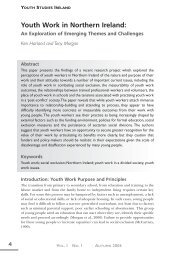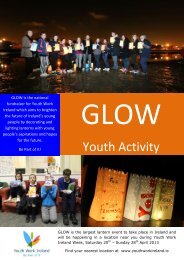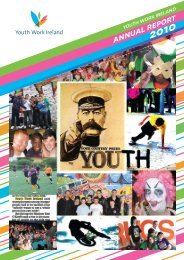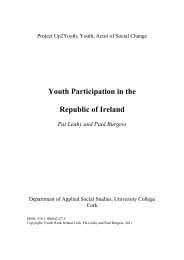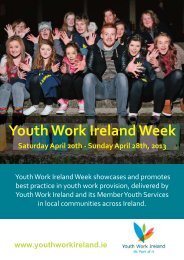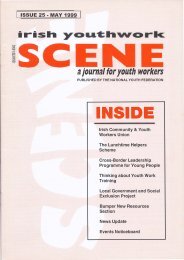Issue 34: November 2001 - Youth Work Ireland
Issue 34: November 2001 - Youth Work Ireland
Issue 34: November 2001 - Youth Work Ireland
Create successful ePaper yourself
Turn your PDF publications into a flip-book with our unique Google optimized e-Paper software.
Taking Ownership ofYour Own CommunityIn 1975 I was one of the three representatives of theNational Federation of <strong>Youth</strong> Clubs who, with delegatesfrom our sister organisations in the U.K. and Denmarkwere planning what became the European Federation of<strong>Youth</strong> Clubs. In the meetings, discussions and study visitsbetween the three countries in advance of that, I realisedin a new way that we had something special and in manyways unique in <strong>Ireland</strong> that was genuinely envied bysocial and community workers in other countries, theextent and importance of voluntary involvement andcommunity based organisations. As a social work studentin London University six or seven years before that I wasconscious of the strong desire of the various Londonboroughs to try to rediscover voluntary commitment andre-energise local community effort and they wereprepared to make vast sums of money available torecreate an attitude and an involvement which had beenlost.Later for over 20 years in the Gorey area I was toexperience at first hand the huge commitment of largenumbers overlong periods in a myriad of community andcaring groups which improved the services, facilities andopportunities in many local areas in North Wexford. I fearthat in the 1990's things began to change quitedramatically and if not halted and reversed we may findourselves in just few years with seriously shrunkencommunity services and opportunities and communitieswhich are more fragmented with less and less people whoare prepared to take ownership for their own communityand its development, less sense of a common purposeand shared vision. In most areas and organisations it isincreasingly more difficult to get people to make the longterm commitment to projects and committees. Many longestablished groups find it virtually impossible to replacemembers who have moved on or retired.There is one other fairly recent trend that is worthreferring to: Among the plethora of new statutory specialprojects and committees it can be more difficult to getadequate recognition and state funding for mainstreamand long established voluntary groups and projects. Forexample there is research from the U.S. showing that adisproportionately large amount of new funding (up to75% in some cases) goes to new projects or planning andresearch. The whole statutory support and funding forcore mainstream voluntary effort which we all tend to takefor panted and I will comeback to this point later.To sum up there are two features of contemporary <strong>Ireland</strong>which cause me considerable anxiety. The first is thedominance of self-interest over a sense of compassion, adisregard for the interest of others, growing isolation fromcommunity life, an unwillingness often to even listen to adifferent point of view. The second is the negligible degreeand negative nature of participation in <strong>Ireland</strong> today. Toofew people bother to have an interest in or concern for theaffairs of their local community or society generally untilsomething goes wrong and there is a problem, whereonpeople too often will follow like sheep the one who bleatsthe loudest.Against this sort of background I think it is particularlytimely that the United Nations should have designated<strong>2001</strong> as the International Year of the Volunteer and I knowhow in the past such specially designated years have ledto new thinking and action and in the case of years of theyoung people, the elderly, children and the handicappedto special new provisions in North Wexford.I welcome especially the decision of The Echo inconjunction with Gorey Community Social ServicesCouncil to publish a monthly feature right through the yearon the work of volunteers in North Wexford and I feelhonoured to have been invited to contribute the firstarticle.Fundraising paradoxically is much more problematic.Many of the well established core services and.mainstream community organisations began in the1970's, which in many ways was a golden age of socialconcern and community involvement. At that time if youhad a half decent idea and sought public support for it,large numbers of volunteers came forward and the fundswere raised relatively painlessly. All that is in fairly sharpcontrast with the experience of many community activiststoday. I have heard many such activists claim - and Iwould feel the same - that many of the things that wereinitiated in those years would be pretty well impossible ormight not tic attempted today.On January 1st R.T.E. Radio had some excellentprogrammes marking 75 years of Radio Broadcasts. Oneof the programmes I tuned in to was where a panel wasdiscussing social changes that period. They were allagreed that there was a serious decline in theneighbourliness and community involvement and that theold extended family was a thing of the past. As I havesaid, one of the richest, positive and most enrichingfeatures of Irish social and community life traditionally hasbeen the extensive level of voluntary involvement. WeIrish <strong>Youth</strong><strong>Work</strong> Scene•<strong>November</strong> <strong>2001</strong>



